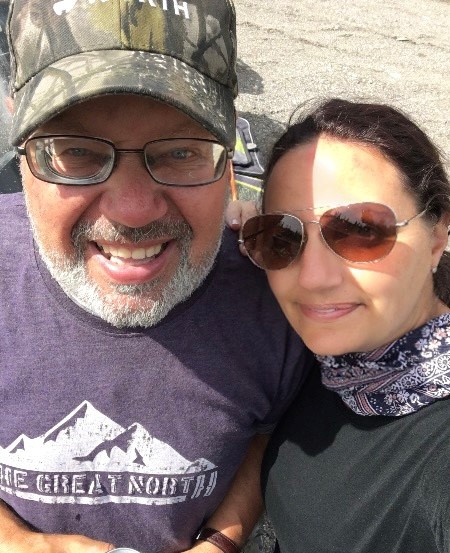
For people like Gilles, a mantle cell lymphoma patient, the availability of treatment options like CAR-T (Chimeric Antigen Receptor T-Cell) therapy are important and potentially transformative.
CAR-T therapy is a promising cell therapy for some aggressive subtypes of lymphoma, like diffuse large B-cell and mantle cell lymphomas. It is an important therapy that provides hope to those with limited treatment options.
Today, we ask that you support Lymphoma Canada with a donation towards research. Research that will lead to new treatments, like CAR-T therapy, and provide hope for patients like Gilles.
Gilles’ cancer journey began in 2017 following some mild but unsettling symptoms – numbness in certain areas of his body which then went away, weight loss thought to be caused by leading a healthier lifestyle, night sweats that were infrequent, and pain in his neck and shoulder which led to the discovery of some lumps.
Gilles had been experiencing these symptoms for about a year, but he and his wife Francis had attributed them to other causes.
“Only when I had found the lumps did I know something was serious and booked [Gilles] a doctor’s appointment the next day.” – Francis
Gilles was sent for blood work and then referred to an ear-nose-throat specialist by his family doctor. The specialist felt Gilles’ neck, stepped back, and said very matter of fact, “you have cancer” and referred him to oncology. There was no further explanation – Gilles and Francis were shocked.
Gilles was referred to an oncologist at a cancer centre who determined, after a biopsy, that he had mantle cell lymphoma, a highly aggressive cancer. He could not wait a day longer to receive treatment. He needed it now.
There was no time to learn about his diagnosis or lymphoma subtype, no time to mentally process his diagnosis and prepare for treatment, no time to give him the support he needed as he was told he had 18 months to live if he didn’t receive treatment.
There weren’t many treatment options available for mantle cell lymphoma and Gilles and Francis were told what the treatment plan would be.
To receive this treatment, they would have to travel to a cancer centre, the closest of which was 220 km away. The trip took a toll on Gilles. On arrival, he was jaundiced and felt extremely unwell.
However, it was important that Gilles began treatment immediately. He was provided with a combination of chemotherapy and immunotherapy. The immunotherapy, unfortunately, led to a severe reaction. His temperature skyrocketed, his blood pressure increased, his heart rate became irregular, and he began having severe rigors (shaking). Treatment was not easy.
Gilles had to stop treatment temporarily, wait until he recovered, and then try again. Thankfully things went smoother the second time around.
Side effects are an unfortunate part of receiving treatment. However, with more research into new targeted therapies, side effects could be reduced.
There was no break, however between this and his next treatment, which was an autologous stem cell transplant.
Again, there wasn’t a cancer centre close enough that could conduct the procedure, so Gilles and Francis had to travel over five hours by airplane and car to come to Toronto.
In April of 2018, Gilles’ stem cells were collected. A grueling process. It took nine days of continuous collections to obtain enough stem cells for the treatment.
He then had a Hickman line placed to prepare for the transplant which would take place at Gilles’ local hospital. Unfortunately, there was an accident with a dressing change and an infection was introduced. Gilles had to have his Hickman line removed, and the transplant was delayed while he recovered with antibiotics.
After another trip to Toronto to re-install the Hickman line, Gilles was finally able to start his stem cell transplant in July.
He was treated with a high-dose chemotherapy before his stem cells were reinfused. Gilles was extremely sick. Following the stem cell transplant, he lost 45 pounds. The mouth sores were awful, food tasted terrible, and everything smelled bad.
Gilles then began maintenance therapy, a medical therapy that is designed to help a primary treatment succeed and therefore prevent a relapse. Thankfully this worked for almost two years, but then he began to have severe abdominal pain. A CT scan later revealed and a mass the size of a softball. Gilles felt so down, he had been in remission and now had to start all over again with treatment.
“We were so afraid that there would be no treatment options left for us to try. Our oncologist introduced us at this time to the possibility of CAR-T therapy. We went online to learn more about this therapy and hope crept into our hearts.” – Francis
There is a real need for research. Research helps to identify new therapies and treatment options that will help people like Gilles when previous therapies fail. It is your generous support that drives research forward. The future of healthcare for lymphoma patients is in all of our hands. Please consider giving a gift today to fund Canadian lymphoma research.
Gilles and Francis remain optimistic about CAR-T therapy and the potential it holds for him.
With your help, we can support lymphoma research that will make new treatments available to Canadians when it matters most.






